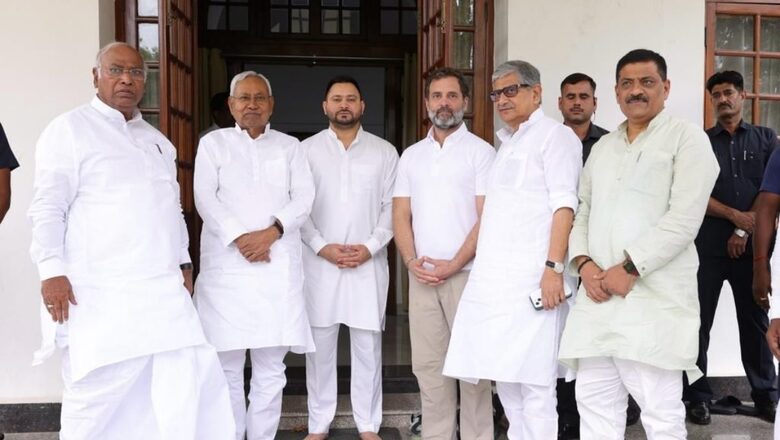
views
The upcoming grand Opposition meeting scheduled to take place in Patna on June 23 has garnered significant attention. Undoubtedly, the gathering of Opposition political parties holds great significance. However, the pressing inquiry remains: what new ideas will emerge from this assembly? As the Opposition gears up to take on Prime Minister Narendra Modi’s Bharatiya Janata Party (BJP), the first meeting to formulate their vision is set to take place. Discussions will be held to lay the groundwork for the Opposition alliance’s strategy. Amidst the fervour surrounding the Opposition’s purported unity, there remain a number of pressing questions regarding the practicality of the ideas being bandied about by individual Opposition leaders, as well as the level of commitment these political parties possess in their bid to challenge the BJP.
Despite high expectations, it is unlikely that anything ground-breaking will emerge from this Opposition meeting. At best, we can expect some visually appealing photo opportunities. As the political climate in India before the 2024 general elections heats up, the Opposition parties are yet to make their stance unequivocally clear. However, it is evident that their primary objective is to challenge the ruling BJP. The aspiration to combat the BJP, however, tends to be confined to regional or state-specific contexts. Ultimately, the Congress has the big ambition of unseating Narendra Modi, so it is important to pay attention to what the great old party offers. As the Opposition alliance negotiations commenced, the Congress party appeared to have taken a backseat and refrained from playing an active role. Bihar Chief Minister and JDU Chief, Nitish Kumar, has been instrumental in bringing together various Opposition parties, effectively serving as an anchor in the process. The question of whether Nitish Kumar’s role is merely temporary or if he will persist in such a capacity is a crucial development to monitor.
Many Formula, No Consensus
Various Opposition political parties have presented their strategies to challenge the BJP. The proposed formulas, while intriguing, face significant challenges and lack widespread agreement. In a recent development, Mamata Banerjee, the Chief Minister of West Bengal and leader of the Trinamool Congress, has put forth a proposal suggesting that in each state, only the strongest Opposition party should contest the upcoming elections. This move aims to consolidate the Opposition vote and increase their chances of victory. Banerjee’s proposal has been met with mixed reactions and is currently being debated by various political parties. Should Congress acquiesce to this formula, it would effectively forfeit its ability to contest in key regions such as West Bengal, Delhi, Punjab, Uttar Pradesh, et al. It appears highly improbable that the grand old party will ever endorse such a proposition. In a similar vein, it is expected that the left-political parties will fiercely oppose Banerjee’s agenda in West Bengal, and it is highly unlikely that they will endorse such a proposal under any circumstances.
In a recent development, Akhilesh Yadav has proposed his PDA formula, which aims to extend outreach to the backward, Dalit, and minority communities. It is now widely recognised among political circles that the BJP has garnered significant support from the backward class and Dalit communities in the state of Uttar Pradesh. It appears that the Opposition will only be able to secure votes from minority groups. Crafting a formula to combat the BJP may not be a viable long-term strategy, as it is improbable that most Opposition parties will endorse such a plan. This state of confusion and indecision will prevail in this meeting too.
In these politically charged times, the Opposition finds itself at a crossroads. And a positive outcome could be to move forward, it is imperative that they establish a committee tasked with exploring various formulas and propositions. By doing so, they may discover a middle path or common ground that will pave the way for agreement and progress. It is imperative that the campaign across India commence without any further delay, as per the terms of the agreement.
Congress Dilemma
The Congress party’s dilemma, which is unquestionably the largest stakeholder in the Opposition alliance, will remain intact. Despite the party’s stated desire to establish a coalition, it appears that the Congress will not sacrifice several states solely for the sake of Opposition unity in the upcoming general elections. Several political parties, including Aam Aadmi Party (AAP), TMC, and Samajwadi Party (SP), have made it clear that they will not entertain Congress’ high-handed approach towards forming an alliance. In a recent development during the Panchayat elections campaign in West Bengal, Mamata Banerjee unequivocally stated that her party will not entertain any compromises with Congress in the state.
Over time, the Congress has seen a decline in its influence and popularity in several states due to the presence of Opposition parties. The decline of Congress in UP can be attributed primarily to the SP, rather than the BJP. In Punjab, the AAP has successfully eroded the Congress’ vote bank. In the absence of a clear stance from the Congress, it is unlikely that other political parties will step up to the plate and take charge. As the party gears up for an important meeting, all eyes are on Congress President Mallikarjun Kharge and senior leader Rahul Gandhi. The party’s stance on crucial issues hangs in the balance, and it is up to these two leaders to make it clear to the public. The lack of decisiveness in the party has been a recurring issue, as evidenced by their failure to take a firm stance on pressing matters. For instance, despite repeated requests from AAP Convenor and Delhi CM Arvind Kejriwal, the party is yet to arrange a meeting with him. Additionally, the Congress is yet to determine its position on the recent ordinance passed by the Centre, which grants it control over the transfer and posting of Delhi government officials.
Way Forward
The upcoming Opposition meeting, which will see the presence of various political parties deliberating on the way forward, is undoubtedly a significant development for the Opposition alliance. Undoubtedly, discrepancies exist within these political factions. For the coalition to succeed, it is imperative that the Opposition not merely rehash old issues already familiar to everyone. Rather, they must present tangible solutions to bridge these differences. For the Opposition’s unity to succeed, it is imperative that both the Congress and the regional parties make certain sacrifices. It is imperative for regional parties to recognise the larger stake of the Congress and refrain from impeding its progress in other states while attempting to expand their own influence. It is unreasonable to expect Congress to acquiesce to such behaviour and compromise on their own objectives. In order to achieve a successful outcome, the upcoming meeting must prioritise the establishment of a common minimum programme and the identification of a shared path forward. At this stage, no big breakthrough is expected from the Opposition meeting in Patna but there can be certain decisions which will determine the future course of action of the coalition.
The author is a Columnist and Doctoral Research Scholar In Media & Politics. He tweets @sayantan_gh. The views expressed in this article are those of the author and do not represent the stand of this publication.


















Comments
0 comment